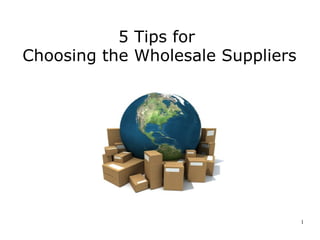
5 Tips for Choosing the Wholesale Suppliers
- 1. 5 Tips for Choosing the Wholesale Suppliers
- 2. Small businesses are struggling with the challenge of how to choose the right suppliers. Many business owners are unaware of what to look for in a supplier beyond just getting the lowest price. Here are 5 tips for choosing the right supplier:
- 3. 1. First determine your business’ requirements. This will help you figure out whether a supplier can meet your requirements. If you don’t know what your specific requirements are, the chances of choosing the wrong suppliers are high. If your company has to meet stringent customer standards, for example, then so will your suppliers in order for your company to be successful.
- 4. 2. Look at total cost (price plus costs incurred before or after product or service delivery) instead of choosing the supplier with the lowest price, as it is important to balance other important elements such as quality, delivery, and service. You don’t want to choose the lowest-price supplier, only to discover hidden costs of doing business, such as poor quality or poor service that drive up your real costs.
- 5. 3. Consider making a site visit to a potentially key or critical wholesale supplier to see their operation firsthand, meet their management, and help increase your knowledge of and comfort level with the supplier. If the supplier is located offshore and visits are not practical, then consider using local resources (who thoroughly understand your requirements, of course) to make the factory audit or baseline inspection.
- 6. 4. In some cases, using a distributor may be a good option for small companies, particularly those who want to buy in smaller quantities than buying directly from manufacturers will permit. This will help keep one’s inventories lower.
- 7. 5. Develop good relationships with suppliers and keep the lines of communications open to help work through changes and problems as they occur. Suppliers with whom you have developed good relationships are often more willing to work through challenges with you than those whom you either don’t know or those with whom your interactions have been adversarial. Developing relationships with your key suppliers is one of the most proactive ways to avoid risk and unpleasant surprises and sometimes even get more favorable terms.